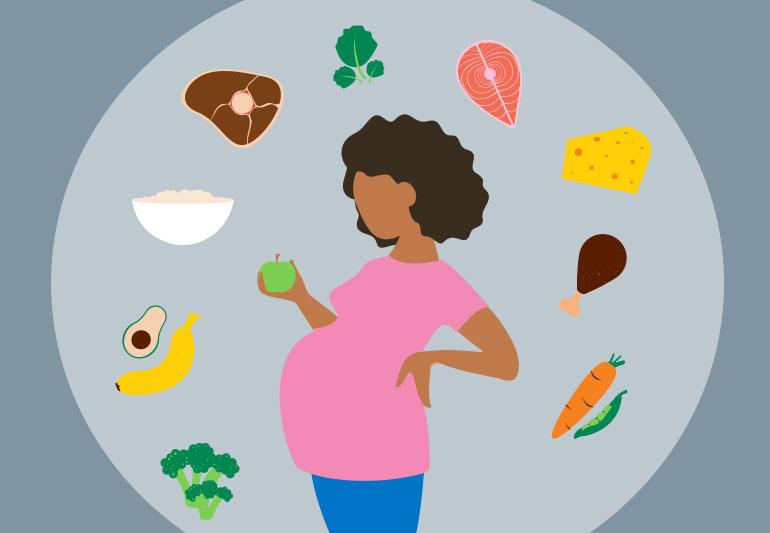


When you are pregnant or nursing, you have a greater need for energy and nutritious substances. The need is not greater than what can be covered by a general diet, however, i.e. a varied diet with limited amounts of fat and sugar and rich in carbohydrates (bread, potatoes, pasta, rice) and fruit and vegetables. In other words, pregnant and nursing women should eat like everyone else.
There are, however, some individual things you should be aware of:
• Women who are planning to become pregnant, or equally who have become pregnant, are recommended to take in 0.4 milligrams of folic acid via a vitamin pill. 0.4 milligrams (mg) are equal to 400 microgrammes (mg ). Folic acid reduces the risk of giving birth to a child with a neural tube defect, which is a rare disease that can result in varying damage from an insignificant bone defect in the spinal marrow to deadly brain damage.
• Too much vitamin A can damage the fetus. Therefore, the official sources advise pregnant women not to eat liver and paté, as the liver is very rich in vitamin A. It is OK to eat liver paste. Nor should you take dietary supplements with a vitamin A content of more than the recommended dose (which is 800 European Units). You can happily take a general vitamin pill every day - and you can also feel free to eat lots of carrots and other vegetables with a high content of beta-carotene. Beta-carotene is converted partly to vitamin A in the body.
• When you are pregnant, you should not drink alcohol. Alcohol can cause serious damage to the fetus if a pregnant woman drinks large amounts. It is known that both daily use of more than one unit and the individual times when you drink more than four units increase the risk of damage to the fetus. You cannot set a limit for the amounts of alcohol that can be dangerous.
• Pregnant women should drink no more than three cups of coffee a day. Large amounts of caffeine can damage the fetus. Other foodstuffs containing caffeine, tea and cola, should also be limited.
• A vitamin pill (multivitamin-mineral tablet) daily during pregnancy and nursing is recommended. If a blood test shows that your iron is low, you should take an iron supplement of 50 - 70 mg/day no later than from 20th week of pregnancy and for the remainder of your pregnancy.
Fish is good but pregnant and nursing women should, because of the high quicksilver content, avoid eating large amounts of the following fish: tuna, skate, halibut, oilfish, swordfish, porbeagle, pike, perch and zander. Eating something like tuna fish salad is not a problem, but pregnant and nursing women should avoid eating great portions of the mentioned fish, for example, a tuna steak. You can happily eat all other general edible fish, and you should also try to eat both fatty and lean fish. If you catch them yourself, you should catch them in different areas.
Note: Please also check your spam or junk email folder.